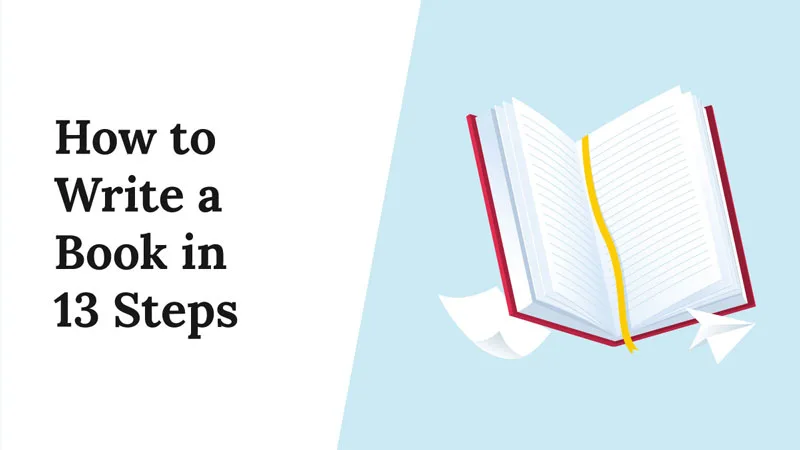Even the most experienced and well-rounded authors mess up sometimes. Whether it’s your first or tenth attempt, it’s important to keep in mind some common mistakes to avoid when writing a book.
One good thing about learning how to write a book for the first time is that you can rest assured many have gone before you and succeeded.
Not only have they found success but they have shared their experience. This helps a new writer know what should be done and what should be avoided.
10 Book Writing Mistakes to Avoid
I have created a list of the top ten mistakes to avoid when writing a book. These will be especially helpful to those with little to no experience with how to write a book.
1. Failing to Know Why
It doesn’t matter what kind of book you’re writing. Be it a comprehensive fantasy novel or a personal memoir, you need to know why you’re writing it.
Diving into a book with no driving force will only lead to another unfinished manuscript sitting in your drawer for years. Seeing a book hit the publication stage will require a strong motivation behind it.
Your objective is what you intend to accomplish with the book. This will affect the way you write, structure, design, and market it.
If you look at your book and realize you don’t know why you’re writing it, try asking yourself a few questions to get started:
Why is this book important to you?
What is the message you are trying to share?
Why does the world need your message?
What parts of your experiences are valuable to other people?
Are you an expert in something?
Are you trying to dominate a specific market or niche?
Is the topic something that simply fascinates you?
These are some questions that will start to reveal your inner motivation – things you maybe hadn’t even realized were there. If none of these questions even begin to resonate with you, perhaps it’s time to find another story to tell.

2. Being too Sales-y
There might be several different motivating factors behind the writing of your book. One of them is probably money, and that’s okay. Money is a part of life and we all need it to get by.
As long as you’re not only writing a book in hopes of getting rich, it’s not bad to be concerned about finances.
If what you’re writing about is valuable and useful to others, they will be happy to pay for it.
The unfortunate reality, though, is that many writers are too focused on making money, and it shows in their writing. Knowing how to write a book properly includes being authentic and transparent.
If you are writing about personal experiences, get personal.
If you aren’t concerned with providing value to your audience, your writing will lack passion. It will lack the drive. It will lack the authenticity that people crave.
So, don’t try too hard to sell yourself. Write your story and share your knowledge. Be real, and the sales will come.
3. Not Knowing Your Reader
Especially when it comes to nonfiction, you need to know who you’re writing for. One of the biggest mistakes a newbie can make is to think they can write a book that is for everyone.
It may seem like a good idea to write something that will appeal to everyone. The more people who can buy it, the more money it will make, right?
Not necessarily. Identifying the reader is important in knowing how to write a novel as well as nonfiction.
Example
You want to write a book that helps writers. You want all types of writers to be able to benefit from your book – first-timers, seasoned writers, novelists, nonfiction authors, and short-story writers.
Think about what this would look like.
You will have a few chapters for each type of writer you’re targeting. The problem with this is that each section will resonate with one set of writers and alienate another.
It is better to choose one area of writing – ideally, the one in which you have the most experience – and hone in on that. The entire book will be useful to the reader who picks it up.
You will also have enough time and room to cover everything this particular writer needs to know, rather than trying to bounce around from topic to topic.
So, spend some time narrowing down your audience. What specific person are you writing for? This will help you structure things properly and write the most effective piece possible.
Learning how to identify your reader will allow for a better experience in all your future writing jobs.
4. Writing Only What You Want to Say
Some writers have a bad habit of being a little bit selfish. They think that their thoughts and opinions are enough to write a book.
Who knows. Maybe they are, but you can’t count on it.
When writing a book, you have a responsibility to the reader. You can’t just write down everything you have to say on a subject and be done with it.
You need to pay attention to what the reader needs to know in addition to what you want to say. This is why it is so important to know and identify your reader.
Most often, readers are looking to help themselves and not just read up on your ramblings.
If you can accurately predict what it is your reader is looking for, you will be able to connect with them on a deeper level. Your book will draw them in and give them something valuable.
Use a Book Writing Template to Help You
If you’re struggling with what to say or how to say it, turning to a book writing template might help. Squibler has a template designed specifically for a nonfiction book:

This template will walk you through the sections of a nonfiction book. It offers guidelines and suggestions without curbing your freedom and creativity.
If you are having any difficulty, it can help you figure out how to say it, and how to say it in the best way.
5. Using Too Much Jargon
Another one of the big mistakes to avoid when writing a book is using too much slang or jargon.
Most nonfiction books aim to educate, empower, or teach. This means that your target audience is looking to know more about the subject you are knowledgeable in.
If you are having a conversation with another expert in your area of expertise, then using the language of the trade is entirely acceptable. If you are going about your day in your chosen field, again, industry-specific language is appropriate.
However, you can’t use these specific words and phrases when educating a newbie. They will soon become confused and your writing will be lost on them.
Part of your book might be teaching these terms and phrases so that your reader can begin using them comfortably. This is fine as long as you provide understandable explanations.
Example
Let’s go back to the subject of writing as an example. You have decided to write a book to help first-time novelists get started. There are many things they need to know about crafting a good story, but they will be unfamiliar with the terms.
Things like:
A narrative
The Antagonist
Sub-plot or plot points
You must explain these terms in a book designed to help new authors instead of just using them.
There are exceptions to this. If you are an expert writing for other experts, it is likely safe to assume they know most of the basic jargon within your industry.
This means you will have a different marketing strategy. You will need to be clear that the book is not for beginners, lest anyone leave a bad review because they didn’t understand the book’s purpose.
6. Writing About Something You Don’t Know
It’s an age-old piece of advice – write what you know. Unfortunately, many take it the wrong way.
This is terrible writing advice for someone learning how to write a novel, specifically. If novelists only wrote what they knew, we’d have a lot of really boring books on our shelves.
However, this is sound advice when talking about how to write a book of nonfiction. Nonfiction, by definition, requires truth and accuracy. You can’t go around making up facts and presenting them as real.
This is where it is important to stick to what you know. Don’t try to jump on a bandwagon and write on a subject simply because it’s selling well. Take what you already know, and market it accordingly.
You don’t have to be a total and complete expert on a subject to write about it. But, don’t make the mistake of attempting to write when you are clueless. You will achieve nothing more than wasted time.
7. Not Doing Research
Being an expert on something doesn’t exempt you from doing research. And I’m not only talking about research for your book.
You need to start by researching your target market and audience. This is essential no matter what you are writing about. Failing to acquire this information will lead to a book with no direction.
Once this is done, your book will require some research as well. Fiction and nonfiction books will all need research. It is the type of research that will vary.
Nonfiction
Even if you know what you are talking about, writing nonfiction will still require research into several things. To name a few:
People. If you are including any reference to real people in your book, the information needs to be accurate. This includes names, dates, backstories, exact quotes, etc.
Facts
Timelines
Locations
Don’t neglect the small things. If there are inaccuracies, there will be a reader that finds them.
However, not including details because you can’t be bothered to confirm them is a bad idea as well. Readers want the whole picture, and it’s up to you to give it to them in the most accurate way possible.
Fiction
Learning how to write a novel includes learning how to research as well. Not all novels will require the same amount of research, but there will always be some to do. You will need to look up things such as:
Settings. Your story can be fictional but still set in a real place. You need to know that place well.
History. Any piece of historical fiction will need to be accurate to the chosen time period. Culture, economy, social classes, government, etc.
Procedures. Writing a crime drama will require you to know how police procedures work. Writing about the medical field will require some knowledge of how a hospital operates. The list goes on.
Accuracy in fiction is just as important as in nonfiction. While your characters and story are made up, the real-life aspects are not.
If you know you are in for a lot of research, you may want to consider using some good book-writing software to help you. Programs like Squibler are designed to help organize and streamline your brainstorming and research efforts.

Squibler keeps everything neat and tidy, allowing you to focus all your energy on the information and the writing itself.
Book Writing Template
To keep you even more organized and on task, Squibler has also created some templates to get you started writing your book. From genre-specific to general nonfiction, there is something for everyone.

Using a template is helpful no matter how experienced you are when it comes to writing a book. It walks you through each section of the book and ensures you include all the necessary elements and requirements.
8. Not Using Dialogue in Nonfiction
Many writers make the mistake of thinking dialogue has no place in a nonfiction book because they haven’t witnessed the conversations themselves.
It is true that by writing nonfiction you are relaying facts and representing the truth. However, you are also trying to create a compelling narrative your readers can follow.
If you have a general idea of an event, you can go ahead and set the scene by writing some dialogue. This could be describing what happened during a business meeting. Or, it might be a more personal exchange between family members.
Whatever the case may be, dialogue adds to the readers’ experience and it allows you to show rather than tell.
9. Not Formatting Properly
Even the most fantastic of books can be ruined by poor formatting. Do not neglect this part of the process.
To you, it may not be as important as what’s inside the book itself. However, as much as people don’t want to admit it, they do judge a book by its cover. They judge it by the cover as well as the overall look.
Formatting includes many things:
Font type
Font size
Page size
Text alignment
Line spacing
Paragraph indents
And more
All of this should be done properly so the book looks clean and professional. Readers will enjoy your work that much more when it is pleasing to look at.
Don’t worry if you’re not an expert designer, or if you don’t know how to format. There are lots of quality designers available for hire.
In addition, many book writing software, Squibler included, is equipped to help you in this area.
10. Publishing Without an Editor
Please, don’t be one of those writers who think they are good enough to do all their own editing. I promise you, this never works out.
Sure, some writers will self-publish without the use of an editor. So the book is published, but is it successful? Probably not, because there will be many mistakes left behind.
You do need to begin by thoroughly editing it yourself. And don’t be gentle. Most of the time, the first draft is full of crap.
As Stephen King puts it: “When your story is ready for rewrite, cut it to the bone. Get rid of every ounce of excess fat. This is going to hurt; revising a story down to the bare essentials is always a little like murdering children, but it must be done.”
Don’t Forgo a Professional
So, edit your own work. Don’t be lazy about it. That said, even the best writers in the world need to have a second set of eyes review their work.
As the writer, you know what you intend to say. This sometimes causes your brain to gloss over a mistake because you will read it the way you meant to write it. This alone presents the need for another perspective.
Editors are professional editors for a reason. They not only know how to correct grammar, syntax, and structure errors, but they will help with the story itself. They will suggest changes to make the plot or narrative better and more effective.
Editors are one of the many writing jobs that the industry can’t do without. There are several ways you can save money in the process of publishing your book, but an editor isn’t one of them. Invest in an editor and create a professional book.
What you can do is use a book writing software such as Grammarly. This is a tool that will scan your work and point out simple grammatical errors. It is then quick and easy to go through and fix them yourself.
It uses a simple hover-and-click system:

Keep in mind that Grammarly does not replace a real editor. But, it will save them some time and effort to have the small things fixed already.
Right Things to Do When Writing a Book
When writing a book, focusing on effective writing strategies is essential to keep your readers engaged and ensure they understand your message. Here are key strategies to help you write effectively:
1. Avoid Comma Splices: Understanding the most common writing mistakes is crucial. This includes avoiding sentence fragments or comma splices. For instance, a comma splice occurs when two independent clauses are joined incorrectly with a comma instead of other punctuation.
2. Choose the Right Words: Using the wrong word can confuse readers and weaken your message. Ensure that every word serves a purpose and contributes to your overall narrative. This is especially important when you write fiction, as precise language enhances your storytelling.
3. Omit Unnecessary Words: Conciseness is key. Omit words that do not add value to your writing. This makes your sentences more direct and impactful, helping the reader understand your message clearly.
4. Separate Sentences Correctly: Proper sentence structure is essential. Separate sentences clearly and avoid run-ons. For example, use conjunctions or punctuation to link independent clauses correctly. This ensures most sentences are easy to read and follow.
5. Avoid Vague Pronoun References: Make sure pronouns clearly refer to specific nouns to avoid confusing readers. Just a vague pronoun reference can lead to misunderstanding. For instance, instead of “When Jane spoke to Mary, she was angry,” specify who was angry: “When Jane spoke to Mary, Jane was angry.”
6. Clarify Your Message: People write for various reasons, but every writer should aim to express their ideas clearly, ensuring each sentence contributes to a clear overall message. Make sure your message is clear and straightforward. Each standalone sentence should contribute to the reader’s understanding. Avoid overly complex structures that can obscure your main points.
7. Use Proper Punctuation: Correct punctuation enhances readability. Avoid common mistakes like comma splices and sentence fragment errors. Use other punctuation marks, such as semicolons and colons, appropriately to connect related ideas.
8. Limit the Use of Exclamation Points: Exclamation points can be distracting and often do not add value to your writing. Use them sparingly and rely on strong word choices and sentence structures to convey emphasis or excitement.
By implementing these strategies, you can avoid the most common writing mistakes and create a book that is clear, engaging, and enjoyable for your readers.
Frequently Asked Questions
Here are some frequently asked questions to help you navigate the journey of writing a book.
What should you not do when writing a book?
Avoid starting without a clear purpose, overloading with jargon, and neglecting proper research and formatting. Don’t edit while drafting or focus solely on making money.
Is there a wrong way to write a book?
Yes, writing without a plan, ignoring feedback, and failing to revise are the wrong ways. Disregarding the target audience or mimicking other authors can lead to a disorganized and unoriginal manuscript.
What is the most common mistake in writing?
The most common mistake is insufficient revision. Many writers submit their first draft without thorough editing, leading to errors in grammar, structure, and coherence.
What is one of the biggest mistakes a new writer can make?
Imitating others instead of embracing their own style. Authenticity is key to compelling content. Self-doubt can stifle creativity, but trusting your unique perspective inspires both you and your readers.



